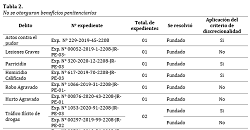Prison benefits and principle of discretion in the Tarapoto Unipersonal CourtsPrison benefits and principle of discretion in the Tarapoto Unipersonal Courts
DOI:
https://doi.org/10.51252/rcri.v4i1.569Keywords:
penal execution code, legal discretionarily, criminal judges, technical body, penitentiary, sentenced prisonersAbstract
The decisions made by judges in the granting of prison benefits are discretionary since it is necessary to analyze the resolutions and compare them with the special norm, so the general objective was to determine how prison benefits are associated with the criterion of discretionality in the resolutions issued by the judges of the Unipersonal Courts of Tarapoto. For this, an applied research of qualitative approach was formulated, the level had hermeneutic characteristics of non-experimental design, the population consisted of 54 resolutions where each file was described and analyzed, also 9 interviews were conducted with judges and case specialists, therefore, the sample reflects the entire population in its non-probabilistic dimension, documentary analysis and interview were used, The results show that there are cases where arbitrariness would be incurred when the grounds for the decision are based on subjective criteria and information, concluding that the discretionality applied by judges is associated with obtaining prison benefits, which means that judges use the criterion and faculty of independence in the decisions to obtain prison benefits.
Downloads
References
Alfaro Alarcon, S. L., & Rojas Altamirano, H. C. (2021). Exigencias legales del beneficio penitenciario de semilibertad frente a la discrecionalidad del juez en el juzgado unipersonal Moyobamba 2020 [Universidad César Vallejo]. https://hdl.handle.net/20.500.12692/81806
Bécquer Carvajal, F., & Pinos Ramírez, A. G. (2021). Los beneficios penitenciarios estipulados en el código orgánico integral penal y el principio de igualdad [Universidad Nocional de Chimborazo]. http://dspace.unach.edu.ec/handle/51000/8056
Coaguila-Valdivia, J. F., Bedoya-Perales, P. V., Huallpa-Mendoza, A. M., & Contreras-Puelles, G. A. (2021). Los Beneficios Penitenciarios en el Periodo 2008-2016 en Arequipa, Peru: Propuesta de Informe Psicológico y Resocialización. Anuario de Psicología Jurídica, 31(1), 1–7. https://doi.org/10.5093/apj2021a1
Cubas Luna, A. L. (2023). Beneficios penitenciarios como derecho a la libertad en el penal Miguel Castro Castro, Distrito San Juan de Lurigancho–Lima. Ciencia Latina Revista Científica Multidisciplinar, 7(2), 4146–4161. https://doi.org/10.37811/cl_rcm.v7i2.5635
Dworkin, R. (1992). El imperio de la Justicia (2nd ed.). Hardvard University Press.
Encinas Duarte, G. A. (2019). Pluralismo razonable en el Estado constitucional: de la tolerancia a la discrecionalidad judicial. Nuevo Derecho, 15(25), 88–109. https://doi.org/10.25057/2500672X.1229
Espinoza Coila, M. (2019). El derecho de ejecución penal y la sucesión de leyes en la concesión de beneficios penitenciarios. Revista de Derecho, 4(1). https://doi.org/10.47712/rd.2019.v4i1.40
Fernández Rodríguez, T. R. (1991). Arbitrariedad y discrecionalidad. In Estudios sobre la Constitución española: homenaje al profesor Eduardo García de Enterría (1st ed., Vol. 3, pp. 2255–2311). Producción Científica.
Flores Aristizabal, E. A., & Mojica Araque, C. A. (2020). Discrecionalidad Judicial. Desarrollo de una categoría en continua construcción. Utopía y Praxis Latinoamericana, 25(1), 50–60. https://doi.org/10.5281/zenodo.39070
Gutierrez Castro, S. A., Larios Dominguez, J. M., & Pérez Renderos, M. N. (2011). Beneficios penitenciarios en el proceso sumario del nuevo codigo procesal pe-naL. San Salvador: Universidad de El Salvador [Universidad de El Salvado]. https://ri.ues.edu.sv/id/eprint/2170
Hernández Sampieri, R., Fernández Collado, C., & Baptista Lucio, P. (2014). Metodología de la investigación (6ta ed.). McGraw-Hill Education.
Irigoín Cubas, J. R. (2022). El Decreto Legislativo n.o 1513, norma para afrontar el hacinamiento y la protección de la salud como derecho fundamental de las personas recluidas en los establecimientos penitenciarios del Perú. Revista Oficial Del Poder Judicial. Órgano de Investigación de La Corte Suprema de Justicia de La República Del Perú, 14(17), 221–240. https://doi.org/10.35292/ropj.v14i17.549
Labrin Lucero, R. Y. (2021). El acceso a los beneficios penitenciarios como garantía constitucional de los reos frente a la efectividad del resarcimiento de las víctimas [Universidad Nacional Pedro Ruiz Gallo]. https://hdl.handle.net/20.500.12893/9175
Larios Fiestas, G. C., & Muñoz Suvikai, F. J. (2021). Beneficios penitenciarios en el ordenamiento de Ejecución Penal como instrumento de deshacinamiento de los centros penitenciarios en Estado de Emergencia [Universidad César Vallejo]. https://hdl.handle.net/20.500.12692/70942
Lorenzetti, R. (2002). La discrecionalidad del Juez en el marco de la legislación por cláusulas generales y los límites constitucionales. Derecho PUCP, 55, 155–180. https://doi.org/10.18800/derechopucp.200201.008
Milla Vásquez, D. G. (2014). Los beneficios penitenciarios como instrumentos de acercamiento a la libertad : análisis desde la legislación iberoamericana [Universidad de Alcalá]. http://hdl.handle.net/10017/22579
Molina Jerez, F. J. (2018). Estado actual de los beneficios de salida. ¿Una reforma necesaria o un beneficio mal aprovechado? Revista de Derecho, 35, 27–45. https://doi.org/10.21703/issn0717-0599/2018.n35-02
Ñaupas Paitán, H., Valdivia Dueñas, M. R., Palacios Vilela, J. J., & Romero Delgado, H. E. (2018). Metodología de la Investigación Científica Cuantitativa - Cualitativa y Redacción de la Tesis (5th ed.). Ediciones de la U.
Pérez Ramírez, B., & Rodríguez Aguirre, X. (2021). Beneficios penitenciarios en México. Una vía para resarcir la desigualdad social en el proceso de reinserción social. Revista de Trabajo Social, 94, 36–49. https://revistatrabajosocial.uc.cl/index.php/RTS/article/view/12632/33303
Vásquez Villanueva, W. A. (2017). La reinserción social en los beneficios penitenciarios de los internos extranjeros del establecimiento penitenciario modelo Ancón II - 2016 [Universidad César Vallejo]. https://hdl.handle.net/20.500.12692/21977
Vidaurre, P. (2015). Las sentencias apeladas ante la CIDH: Caso Colombiano. Bogotá. Colombia. Edit. Juris Legis Colombia.

Published
How to Cite
Issue
Section
License
Copyright (c) 2024 Naomi Del Camen Guevara-Garate

This work is licensed under a Creative Commons Attribution 4.0 International License.
The authors retain their rights:
a. The authors retain their trademark and patent rights, as well as any process or procedure described in the article.
b. The authors retain the right to share, copy, distribute, execute and publicly communicate the article published in the Ratio Iure Scientific Journal (RCRI) (for example, place it in an institutional repository or publish it in a book), with an acknowledgment of its initial publication in the RCRI.
c. Authors retain the right to make a subsequent publication of their work, to use the article or any part of it (for example: a compilation of their works, notes for conferences, thesis, or for a book), provided that they indicate the source of publication (authors of the work, journal, volume, number and date).






